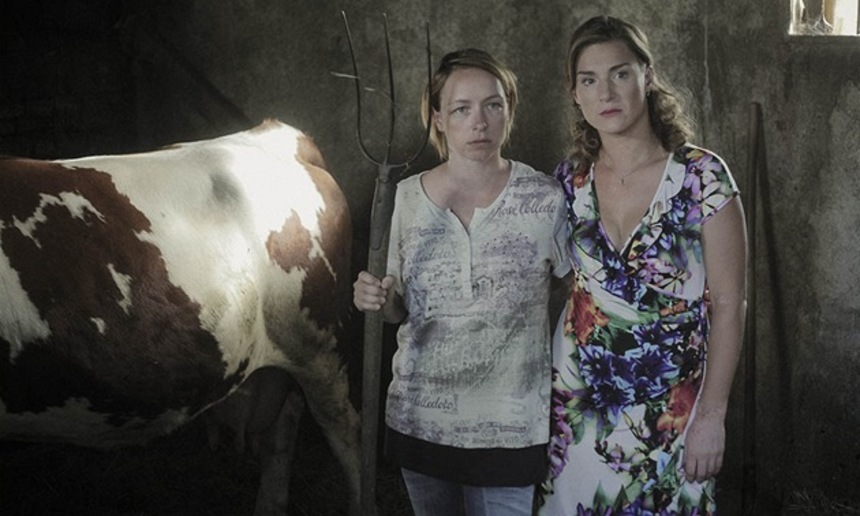Review: NOWHERE IN MORAVIA, Czech Gothic Painted In Bleak Comedy

His debut, a bleak comedy Nowhere in Moravia, adheres to the current theme of floppers as a zeitgeist defining topic. And Krobot´s stab on the subject affirms that it is not a sole privilege belonging to young filmmakers by taking viewers for a stroll through an existential wasteland where a tiny population leads their grey lives.
Maruna (amusingly laidback Tatiana Vilhelmová) works in a local pub, axis mundi of a bucolic village and a parochial institution along the church, serving the same drinks to the same barflies following religiously the same daily routine (she also plays organ in the church). She lives with her a bit oppressive mother and a sister Jaruna (Krobot´s daughter Lenka) who works as a nurse. One day, an opportunity arises for Jaruna to start a decent life in nearby Germany when an elderly gentleman, Hans, comes to the village to bury his recently deceased sister. The sugar-daddy element (she late thirties, he past sixties) suspiciously eased up and underdeveloped for a blackish comedy stands as a turning point and memento that a better life can be indeed achieved (at what cost remains open for a discussion). However, Maruna untouched by the chivalrous rescue continues in her idle life.
The plot revolves around Maruna´s daily routine expanded by occasional ventures into lives of few other residents. A secondary storyline on a ménage à trois of forest workers gone awry provides necessary action and thrill for viewers and inhabitants of the village alike. Krobot and his co-writer Lubomír Smékal, a psychologist, subvert a joke why men cannot share the same woman and at the same time, they produce a counter figure to Maruna. Balin (David Novotný) and Laďa (Hynek Čermák) are friends who work together, drink together, live together in the same household and screw the same wife. Laďa´s wife (delightfully frisky Simona Babčáková), referred to only as ,,Laďa´s old lady", needs a little kick by alcohol to make it through day and life eventually. The free-spiritness induced by fire water and spontaneous urge to live a life (surprisingly by joining vagrants on the skirts) leads her to a gruesome doom and makes her the butt of the joke. However, she becomes the example of inaptness to live a normal life compared to Maruna who goes from one day to another armoured by a detachment and indifference while not having high expectations from life. And Tatiana Vilhelmová excels in channelling both of them.
Smékal and Krobot disclosed sources of humour as Coen bros, Mrštík bros and Kaurismäki in a finnish-jewish-moravia brand of comedy mostly manifesting itself in a deadpan fashion. Ondřej Sokol and Martin Finger had already listed Coens (although McDonagh seems to have bigger impact) as an influence on their black comedy Krásno. Furthermore, Nowhere in Moravia stems from a domestic cuisine of village comedies. My Sweet Village by Jiří Menzel, Bohdan Sláma´s films, Věra Chytilová´s cult comedy The Inheritance or Fuckoffguysgoodday or lately a series of awfully low-class albeit highly popular folk comedies Babovřesky by Zdeněk Troška belong among plethora of them in Czech cinema. Smékal and Krobot put a little spin on the genre by stamping a darker brand of humour on a depiction of local working class´ rather futile life (hence the reference to Aki Kaurismäki).
The film poster being an allusion to Wood´s famous painting American Gothic, with both sisters posing as the central Midwestern couple, possesses almost similar ambiguity as the original painting. "There is [Jesenicko in the former Sudetenland] a lot of aggression, alcoholism and other dependencies...," explains Lubomír Smékal why they chose the exact location while enumerating folklore features easily anticipated in a what might look like a hillbilly comedy yet he adds: "There is a folk who tries to not resign and actively influence their own life. And I wanted to pay a tribute and respect to those people." Krobot´s cinematic endeavour doesn´t slip into a farce neither social drama niche and rather hovers in between with stylized static shots capturing idle life.
As village comedies are firmly anchored in domestic cinema, Nowhere in Moravia invigorates the genre through inclination towards bleaker tinges of humour. Even though sparsely plotted and lacking bolder comic moments (Krásno´s gay couple of undertakers for instance), Krobot´s debut offers a different look on the genre in an existentialist coating and hopefully predicts more dark comedies coming.

Do you feel this content is inappropriate or infringes upon your rights? Click here to report it, or see our DMCA policy.






